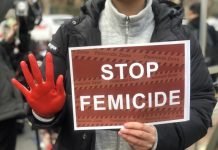Two Turkish women’s rights activists said in an interview that during the COVID-19 pandemic there had been an increase in female suicides and accidental deaths and that the authorities should thoroughly investigate the circumstances surrounding those deaths.
Speaking to the pro-women’s rights website Feminisite, Ezgi Aslan and Fidan Ataselim from the We Will Stop Femicide Platform said many women have died under suspicious circumstances that have either gone down in official records as suicides or accidents.
Both activists said during the pandemic most people had been confined to their homes and that women did not have access to assistance if they were confronted with domestic violence. “We don’t really know what happened in people’s homes during the pandemic. Unfortunately there is not much data to determine if violence increased, and there does not seem to be an increase in femicide. However, there is a definite increase in suicides and accidental deaths,” said Ataselim.
She explained that sometimes women were victims of murder but that their deaths were covered up as suicides.
“There has been a lot of deaths where women have fallen from a height. In such cases there are many injuries to the body and broken bones; however, in most cases nobody checks to see if some of the injuries occurred before the fall. So yes, according to the autopsy the women have many broken bones, but we need to know exactly how those injuries occurred.” said Aslan.
Aslan criticized the authorities for not properly keeping track of women who allegedly committed suicide and as a result of accidents. “Until murder is definitely ruled out, we consider every death a possible femicide,” Aslan said.
They also demanded that the government monitor exactly how many women are murdered annually, criticizing the government for not providing the real number of women killed.
Ataselim and Aslan said women’s organizations had carried out incredible work to raise awareness of increasing femicide. “Perpetrators of femicide are fully aware that the legal system is not diligent in investigating women’s deaths,” said Aslan. “They know there is a good chance they can get away with murder. However, women’s organizations have raised public awareness, closely monitored each step of investigations and made sure nobody gets away with murder.”
Activists pointed to the highly publicized case of Şule Çet, 23, a student who died after falling from the 20th floor of a building in Ankara. Çet’s death was initially ruled as a suicide; however, her family, lawyers and activists demanded a thorough investigation, claiming she was murdered by her employer. Two suspects, the employer and a friend, were let go by the police after their interrogation, causing a public outcry.
Amid social media campaigns and protests initiated by women’s associations, an investigation was carried out. An autopsy indicated that Çet was raped and that her body showed signs of a struggle. It also indicated that she was strangled before the fall. More than a year after the incident, the prime suspect, Çet’s employer Çağatay Aksu, was sentenced to life in prison, and his accomplice Berk Akand was sentenced to 18 years, nine months for murder.
In most cases women reached out to their families or friends and tell them about their fears or if they were being subjected to violence. These accounts have later been instrumental in pursuing a murder case.
Ataselim explained that investigators needed to speak with the victim’s parents and friends to get a full picture of the circumstances surrounding their death, but most of the time this did not happen.
“In most cases activists have to pressure authorities to take such accounts into consideration,” said Ataselim. “Otherwise, they are never taken into account.”
Femicides and violence against women are serious problems in Turkey, where women get killed, raped or beaten every day. Many critics say the main reason behind the situation is the policies of the Justice and Development Party (AKP) government, which protects violent and abusive men by granting them impunity.
Turkish President Recep Tayyip Erdoğan withdrew Turkey from the Istanbul Convention, the Council of Europe’s binding treaty to prevent and combat violence against women, on March 20, despite high statistics of violence targeting women in the country and drawing condemnation from Turks and the international community.















